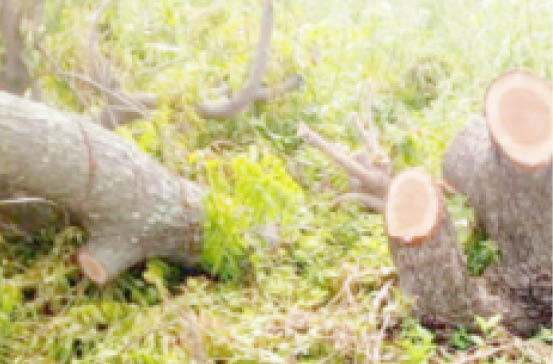Amid the rising cost of cooking gas, many more people are turning to firewood and charcoal to fire their stoves to cook, leading to an unsustainable increase in tree felling in Benue State.
Indeed this shift, driven by the unaffordability of gas for the average household, continues to force many to seek cheaper alternatives.
Millicent Chubby, a resident of Nyon suburb in Makurdi, is one of those who have to seek quick alternatives after she had to abandon cooking gas due to its skyrocketing prices.
She told our correspondent in Makurdi that even charcoal, once a more affordable option, has seen over 300 per cent price hike, pushing her to fall back to firewood for cooking her daily meals.
- NIGERIA DAILY: “Why I Can No Longer Afford To Train My Children”
- FG to split unity colleges into basic, secondary schools
Like Chubby, many others are struggling to cope as the costs of basic necessities continue to rise.
Murshima Iorter, a resident of Yaikor, no longer sees it as shameful for her family to head into the nearby bush in search of firewood as the rising costs of gas, kerosene and charcoal have made it a harsh necessity for many, regardless of their status.
“If you walk into the bush around here, you’ll see exactly what I mean,” Iorter said.
“People are cutting down trees left and right, and it’s no longer just about social standing. Everyone is feeling the pinch of these soaring prices. We’re all just trying to survive,” she said.
Our correspondent reports that that was why Orshi Henry, covering a Deputy Director in charge of Forestry Management and Protection, maintained that there were lots of reasons aiding and abetting the practice, which was quite high in the state.
Henry noted that the extent of cutting down trees indiscriminately was worrisome.
“As professionals, we prescribe sustainability usability. Due process should be followed and agencies of government be consulted before felling trees. The climate change/global warming today is directly linked to the removal of the forest cover,” he said.
“Trees have the capacity to bridge the gap for agricultural purposes and other purposes for human survival, apart from helping against desertification. It also helps in ameliorating the environment, the soil and the climate and our atmosphere generally,” he added.
To this end, stakeholders in Benue State harped on urgent mitigation strategies to curb the menace of climate change as rainfalls are no longer predictable.
The discourse came to the fore during an interactive session at an environmental and climate-related risks mitigation workshop in Makurdi, where stakeholders raised the alarm that climate change can crumble the livelihoods of individuals and nations if no action was taken.
A non-governmental organisation in Ega Ibilla Oju LGA of Benue State, Elim CVTC, organised the recent two-day training for Benue journalists and other participants including the Director General of the Council of Climate Change and representatives from the state Ministry of Water Resources, Environment and Climate Change on Environmental and Climate-Related Risks Mitigation.
The training was also to improve branding and visibility for the Enabling Resilience to Climate Change Related Risks through Local Civil Society Organisations Strengthening (ER2CC) project co-founded by the European Union (EU) and Christian Blind Mission (CBM).
The resource person, Victoria Esa, from the Environmental and Climate Change Amelioration Initiative, (ECCAI) who was represented by Pius Ogolekwu, described flooding, deforestation among others as major climatic risks in Benue State.
Meanwhile, in a sobering reflection on the state of the environment, Esa painted a vivid picture of the growing climate crisis in Benue State, where the effects of river overflows, heavy rainfall, poor drainage systems, and deforestation are becoming impossible to ignore.
These man-made problems are not only accelerating climate change but also pushing the region’s rich biodiversity to the brink of collapse.
“We are witnessing the slow disappearance of animal species,” he lamented, “due to harmful human practices.”
Esa’s call to action was especially directed at journalists, urging them to take on the responsibility of telling the untold stories of those already affected by climate change.
“Journalists must become the voice of the voiceless,” she emphasised, challenging them to go beyond reporting statistics and instead connect with the real human suffering behind the headlines.
She added that by raising awareness of available mitigation approaches, journalists could help communities adopt climate-smart solutions and foster a climate-resilient future.
“Time is running out. Without collective action and informed advocacy, both people and wildlife will continue to suffer the devastating consequences of environmental neglect,” Esa stated.
One of the participants, an assistant director, Climate Change at the Ministry of Water Resources, Environment and Climate Change, Comrade Paul Idyu, noted that climate change had come to stay, lamenting that environmental patterns are changing, rainfalls are no longer predictable and flood now comes at will.
He appealed to participants for united effort to raise awareness about harmful practices that worsen the effects of climate change in the state, including issues like improper waste disposal, deforestation and bush burning, which are contributing to environmental degradation.
Idyu pointed out the importance of promoting positive actions, such as tree planting and adopting climate-smart agricultural practices and encouraged everyone to take advantage of government programmes designed to support the efforts, emphasising that the fight against climate change requires the collective action of the entire community.
“By working together”, he urged, “We can help protect the environment for future generations.”
Earlier, the Programme Manager and Executive Director of Elim CVTC, Emmanuel Egbodo, in his address stressed the need for all hands to be on deck to tackle the challenge.
He noted that the purpose of the event was to provide journalists with a deeper understanding of environmental and climate-related risks specific to Benue State, focusing on their causes, impacts and mitigation strategies.
Egbodo, speaking through Project Coordinator Mrs. Rachel Achimba, emphasised the importance of equipping journalists with the knowledge and tools required to effectively communicate climate risks and advocate for resilience in the region.
This training, he noted, was critical in addressing the growing challenges posed by climate change and in fostering a more informed public discourse on the issue.
Scholastica Hir, one of the journalists who attended the workshop, described the experience as a powerful eye-opener. She expressed her renewed sense of responsibility, vowing to start applying the knowledge she gained immediately and to begin right in her own neighbourhood.
She said, “In my community, environmental abuse has become the norm, trees are cut down indiscriminately, waste is dumped carelessly, and bush burning is rampant.
“I now realise how harmful these practices are, and I’m determined to use my voice and platform to change the narrative. It’s time we start protecting our environment, one neighbourhood at a time,” she said.
Hir’s words captured the spirit of the training—empowering individuals to take action in their own communities to combat climate change.
On his part, the Director General, Benue State Council on Climate Change, Dr Daniel Mailumo, commended the state governor, Hyacinth Alia, for changing the nomenclature of the Ministry of Water Resources and Environment to include Climate Change and also for creating a department of Climate Change at the ministry as well as the council on climate change.
He said the training came at the right time when climate change is affecting the world, Nigeria and Benue State in diverse ways.
Mailumo emphasised the grave threat climate change poses, warning that if left unchecked, it could devastate the livelihoods of individuals and entire nations.
However, his message was not one of despair, but of hope and action, as he praised the funders of the project for their foresight and commitment and proudly noted that the Benue State government has already shifted from merely talking about climate change to taking real, impactful action.
The climate change DG called on journalists to become allies in this fight, urging them to use their platforms to educate the public on the dangers of climate change and the steps they can take to help mitigate its effects.
“The time for rhetoric is over. It’s time to act and together, we can build a more resilient and sustainable future for all,” Mailumo said.

 Join Daily Trust WhatsApp Community For Quick Access To News and Happenings Around You.
Join Daily Trust WhatsApp Community For Quick Access To News and Happenings Around You.


